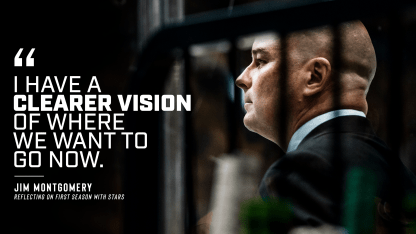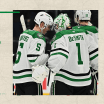Heika: The team started last season with a certain game plan, and that changed drastically when you lost players like Stephen Johns, Marc Methot and Martin Hanzal to injury. By the end of the year, you were a very different team, so what was that process like?
Montgomery: That's very similar to what I've done before. You always come in with ideas on how your team is going to be or how certain individual are going to be, and it always changes. So then you reconfigure pieces and figure out how to motivate certain players, and it's a process. Tyler (Seguin) and I went through that. But that's the fun part for me -- that's the coaching.
Heika: In talking to Tyler Seguin, it seems like you and he developed a strong relationship. Did you enjoy the process of coaching high-end professional athletes and finding a way to connect?
Montgomery: I think it happened with a lot of players. I liked the fact that our relationships evolved and that they were in a much better place at the end of the season than they were at the beginning. To me, that's the biggest confidence grower that I had throughout the year. I learned that me being myself can work at this level like it has at other levels. You don't know that until you go through it.
I could see the tide start to turn in January. At the beginning of the year, I would say something and you could tell that the players were like, 'Where is this going to go?' And that's part of the process, you've got to earn their trust. Then, at the end of the year, they would turn to me and say, 'What faceoff play do you want to run?' And that's when I knew we were growing as a group.
Heika: Did you have to adapt or change your style?
Montgomery: I really think it comes down to I believe in treating people honestly and I believe we are very fortunate to be able to work in this game, and that we can laugh together and work hard together and push each other and pull each other all for the benefit of the group. That means there are going to tough conversations, and that's OK. Anything worth fighting for, there's going to be adversity. That's where I think as a group, that was the biggest positive. By the end of the year, we were pulling through things together.
Heika: When you look back at the two playoff series, were there things you learned? Do you go back and assess what went right or what went wrong?
Montgomery: Definitely, there are things that I learned. I look back at decisions I made, and that's the playoffs and the regular season, and I can say these were positive, and these are things I would do differently. To learn from them and have that experience going into next year, I'm in a much more comfortable area knowing we can specifically target areas where we can get better on the ice and off the ice. I have a clearer vision of where we want to go now.



















